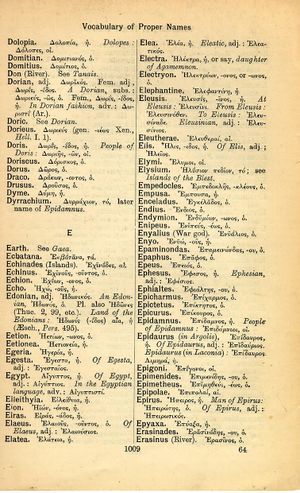Ephesus: Difference between revisions
τὸν ἰητρὸν δοκέει μοι ἄριστον εἶναι πρόνοιαν ἐπιτηδεύειν → it appears to me a most excellent thing for the physician to cultivate prognosis
(Gf-D_3) |
(3_5) |
||
| Line 10: | Line 10: | ||
{{Gaffiot | {{Gaffiot | ||
|gf=<b>Ĕphĕsus</b>,¹¹ ī, f. ([[Ἔφεσος]]), Éphèse [ville d’Ionie, célèbre par son temple de Diane] : Pl. Bacch. 171 ; Plin. 5, 131 || <b>-sĭus</b>, a, um, d’Éphèse : Cic. Div. 1, 47 || <b>-sĭī</b>, ōrum, m., Éphésiens, habitants d’Éphèse : Cic. Tusc. 5, 105.||<b>-sĭus</b>, a, um, d’Éphèse : Cic. Div. 1, 47||<b>-sĭī</b>, ōrum, m., Éphésiens, habitants d’Éphèse : Cic. Tusc. 5, 105. | |gf=<b>Ĕphĕsus</b>,¹¹ ī, f. ([[Ἔφεσος]]), Éphèse [ville d’Ionie, célèbre par son temple de Diane] : Pl. Bacch. 171 ; Plin. 5, 131 || <b>-sĭus</b>, a, um, d’Éphèse : Cic. Div. 1, 47 || <b>-sĭī</b>, ōrum, m., Éphésiens, habitants d’Éphèse : Cic. Tusc. 5, 105.||<b>-sĭus</b>, a, um, d’Éphèse : Cic. Div. 1, 47||<b>-sĭī</b>, ōrum, m., Éphésiens, habitants d’Éphèse : Cic. Tusc. 5, 105. | ||
}} | |||
{{Georges | |||
|georg=Ephesus (-os), ī, f. ([[Ἔφεσος]]), eine der [[zwölf]] Ionischen Städte in Kleinasien, [[berühmt]] [[durch]] den Dianentempel u. [[später]] [[durch]] Rhetorenschulen, j. [[Dorf]] Ayasaluk (d.i. Ἅγιος Θεόλογος, [[ein]] [[Beiname]] [[des]] Apostels [[Johannes]]), Plaut. Bacch. 171. Liv. 37, 45, 2 u. 19. [[Mela]] 1. § 88. Tac. dial. 15. – Dav. [[Ephesius]], a, um (Εφέσιος), ephesisch, Cic. – Plur. subst., Ephesiī, ōrum, m., die Einw. [[von]] [[Ephesus]], die Epheser, Plin. | |||
}} | }} | ||
Revision as of 09:23, 15 August 2017
English > Greek (Woodhouse)
Ἔφεσος, ἡ.
Ephesian, adj.: Ἐφέσιος.
Latin > English (Lewis & Short)
Ĕphĕsus: i, f., = Ἔφεσος,
I an old and celebrated commercial city of Ionia, with a temple to Diana, now ruins near the village of Ayasaluk, Mel. 1, 17, 2; Plin. 5, 29, 31, § 131 sqq.; Plaut. Bacch. 2, 1, 2; 2, 3, 75; 102; 4, 9, 124 et saep.—Derivv.,
II Ĕphĕsĭus, a, um, adj., Ephesian: Diana, Plaut. Bacch. 2, 3, 73; id. Mil. 2, 5, 1; Cic. Div. 1, 23 fin.: mater, born at Ephesus, id. Phil. 3, 6, 15: pecunia, deposited in the temple there, Caes. B. C. 3, 33 fin.; 3, 105, 1. —Subst.: Ephesii, ōrum, m., the Ephesians, Plaut. Bacch. 2, 3, 75; Cic. Tusc. 5, 36, 105; Plin. 34, 8, 19, § 58 al.
Latin > French (Gaffiot 2016)
Ĕphĕsus,¹¹ ī, f. (Ἔφεσος), Éphèse [ville d’Ionie, célèbre par son temple de Diane] : Pl. Bacch. 171 ; Plin. 5, 131 || -sĭus, a, um, d’Éphèse : Cic. Div. 1, 47 || -sĭī, ōrum, m., Éphésiens, habitants d’Éphèse : Cic. Tusc. 5, 105.
Latin > German (Georges)
Ephesus (-os), ī, f. (Ἔφεσος), eine der zwölf Ionischen Städte in Kleinasien, berühmt durch den Dianentempel u. später durch Rhetorenschulen, j. Dorf Ayasaluk (d.i. Ἅγιος Θεόλογος, ein Beiname des Apostels Johannes), Plaut. Bacch. 171. Liv. 37, 45, 2 u. 19. Mela 1. § 88. Tac. dial. 15. – Dav. Ephesius, a, um (Εφέσιος), ephesisch, Cic. – Plur. subst., Ephesiī, ōrum, m., die Einw. von Ephesus, die Epheser, Plin.

